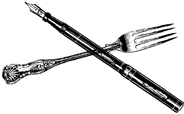Dolen Perkins-Valdez

Louie Escobar
SELECTED WOEKS
 Wench (2010)
Wench (2010)
Inspiration I am inspired to write stories that need to be told. There are so many out there, and if we don't write and record these stories then the memories will die. I often think of my grandmother's extraordinary life and wish that she had written a journal that I could have and keep. When I began to write, it was so that the generations after me would have a record.
Readers Should Know My writing comes from my heart. Many people have called my book, Wench, “heartfelt.” I take this as the highest compliment. My hope is that I can develop my writing craft enough to clearly tell the stories that haunt my conscience.
Readers Frequently Ask The question I receive most often about Wench is:“Do Lizzie and Drayle really love each other?” This is a question I asked myself as I began the book. Yet I found that, after finishing the book, I still was never able to answer it for myself. Their relationship is complicated. I leave it to the reader to decide.
Influences on My Writing I am influenced by Toni Morrison's bravery, unflinching eye, and incredibly high level of writing craft. I am influenced by Gabriel García Márquez's ability to take on the very biggest themes of human existence. I am influenced by Gayl Jones's beautifully seamless integration of African American idiom and romantic, lyrical prose.
MAWU'S MAGICAL GUMBO
Makes 8–12 servings
Courtesy of Sylvester Thornton
In Part I of my historical novel Wench, my protagonist Lizzie meets another slave, Mawu, who makes a stew that, she says, can “soften the white man.” Mawu practices hoodoo, an African American folk tradition that uses spells and potions for various magical practices. After the book came out, many readers wrote to me asking what was in Mawu's magical stew. I did not have a recipe in mind at the time that I wrote the book, so I called upon my uncle, Sylvester Thornton, who is the most accomplished cook in my family. The fact that we all respect Uncle Sylvester is a great testament to his skill as I come from a large southern family of men and women in Memphis, Tennessee, who all cook very well. Yet Uncle Sylvester is a true master when he is in the kitchen.
Many cooks in the southern African American tradition learn to cook from their elders. My uncle learned from his mother, Millerine Thornton, and he taught me and my cousins. My mother also gave me many lessons in the kitchen when I was growing up. I was taught to read a recipe, but they encouraged me to bring my own creativity to it. I have always been inspired by the creativity of slave cooks who fashioned an entire cuisine out of meager ingredients. As the old folks would say, they “turned guts into chit'lins.”
I hope you enjoy my Uncle Sylvester Thornton's gumbo. My hope is that it will “soften” everyone who eats it.
2 small (4-pound) wild ducks, quartered
1 large yellow onion, diced
¾ cup olive oil, divided
1 large red or green bell pepper, diced
3–4 celery stalks, diced
2 garlic cloves, minced
1 cup all-purpose flour
2 teaspoons salt, plus additional if needed
½ teaspoon ground black pepper
8 cups chicken broth
32 ounces frozen okra
5 chopped tomatoes
1 bay leaf
1 teaspoon dried thyme
Rice, for serving
Chopped fresh parsley, for garnish
1 Place duck in a large stockpot with enough water to cover and boil until tender (about an hour). Add a little of the diced onion to the water.
2 While duck is boiling, prepare the gumbo: In a large (minimum 3-quart) saucepan or stockpot, heat ¼ cup olive oil over medium heat. Add onion, bell pepper, celery, and garlic and sauté until tender, about 10 minutes. Remove from pan and set aside.
3 In the same pan, make a light roux: Pour ½ cup olive oil into pan, add flour and stir constantly over medium heat until golden brown. Add salt and pepper. Gradually stir in chicken broth. Boil until slightly thickened. Roux should have the consistency of a tomato sauce.
4 Add okra, tomatoes, and bay leaf to thickened roux. Simmer on medium heat 25–30 minutes. Add sautéed bell pepper, onion, celery, and garlic.
5 When duck is tender, drain the broth, saving just a bit. Discard onion. Cool duck, and pull apart or cut it into medium pieces before adding to gumbo with reserved broth, thyme, and additional salt and pepper to taste. Cook gumbo uncovered about 30–45 minutes on medium heat. Remove bay leaf before serving.
6 Serve over rice. Sprinkle with fresh parsley.
